- Home
- William Golding
The Scorpion God: Three Short Novels Page 13
The Scorpion God: Three Short Novels Read online
Page 13
Mamillius spoke.
“ ‘The speechless eloquence of beauty——’ ”
“I have heard that before somewhere,” said the Emperor thoughtfully. “Bion, I think, or is it Meleager?”
Phanocles cried out.
“Caesar!”
“Ah, yes. Your model. What do you want?”
“Let a light be brought.”
One of the women returned with the ritual solemnity to the loggia.
“What is you model called?”
“She has no name.”
“A ship without a name? Find one, Mamillius.”
“I do not care for her. Amphitrite.”
Mamillius yawned elaborately.
“I think, Grandfather, with your permission——”
The Emperor beamed up at him. “Ensure that our guests are comfortable.”
Mamillius moved with a rush towards the curtain.
“Mamillius!”
“Caesar?”
“I am sorry that you are so bored.”
Mamillius paused.
“Bored? Yes. I am. Sleep well, Grandfather.”
Mamillius strolled through the curtains with an air of leisurely indifference.
They heard how his steps quickened immediately he was out of sight. The Emperor laughed and looked down at the boat.
“She is unseaworthy, flat-bottomed, with little sheer and bows like a corn-barge. What are the ornaments? Have they a religious significance?”
“Hardly, Caesar.”
“So you want to play boats with me? If I were not charmed with your innocence I should be displeased at your presumption.”
“I have three toys for you, Caesar. This is only the first.”
“I entertain you.”
“Caesar. Have you ever seen water boiling in a pot?”
“I have.”
“There is much steam evolved which escapes into the air. If the pot were closed what would happen?”
“The steam could not escape.”
“The pot would burst. The force exerted by steam is titanic.”
“Really!” said the Emperor with interest. “Have you ever seen a pot burst?”
Phanocles mastered himself.
“Beyond Syria there is a savage tribe. They inhabit a land full of natural oil and inflammable vapour. When they desire to cook they lead the vapour through pipes into stoves at the sides of their houses. The meat these natives eat is tough and must be cooked for a long time. They put one dish on top of another, inverted. Now the steam builds up a pressure under the pot that penetrates the meat and cooks it thoroughly and quickly.”
“Will not the steam burst the pot?”
“There is the ingenuity of the device. If the pressure becomes too great it will lift the pot and allow the steam to escape. But do you not see? The upper lid is lifted—steam could lift a weight that an elephant would baulk at.”
The Emperor was sitting upright, leaning forward, his hands on the arms of his chair.
“And the flavour, Phanocles! It will be confined! The whole wonderful intention of the comestible will be preserved by magic!”
He stood up and began to pace round the loggia.
“We should taste meat for the first time——”
“But——”
“I have always been a primitive where meat is concerned. Elephant’s foot and mammoth, your rarities, spices, unguents, they are unworthy and vulgar. My grandson would plead that we should explore all variables and enlarge, as it were, the frontiers of gustatory experience——”
“My ship——”
“—but that is boy’s talk. To taste meat in its exquisite simplicity would be a return to those experiences of youth that time has blunted. There should be a wood fire, a healthy tiredness in the limbs, and if possible a sense of peril. Then a robust red wine——”
They faced each other, two mouths open but for different reasons.
“Phanocles, we are on the verge of an immense discovery. What do the natives call their two dishes?”
“A pressure cooker.”
“How soon could you make me one? Or perhaps if we simply inverted one dish over another——”
He was tapping one finger into the palm of the other hand, looking sideways at the garden but not seeing it.
“—or fish perhaps? Fowl? I think on the whole that fish would be preferable. One must find a little white wine of sufficient modesty to disclaim any self-pretension and sink itself wholly. Trout? Turbot? And at the same time of sufficient integrity to wait devotedly in attendance——”
He turned back to Phanocles.
“There is a southern vintage from that place in Sicily if I could remember the name——”
“Caesar!”
“You must dine with me now and we will formulate a plan of action. Yes, I dine very late. I find it gives me an appetite.”
“But my boat, Caesar!”
“Amphitrite?”
Poised, ready to go, the Emperor waited.
“I could give you anything, Phanocles. What do you want?”
“When the wind falls what happens to a ship?”
Indulgently, the Emperor turned to him.
“She waits for the next one. The master invokes a wind. Sacrifices and so on.”
“But if he does not believe in a wind god?”
“Then I suppose he does not get a wind.”
“But if the wind fails at a moment of crisis for your warships?”
“The slaves row.”
“And when they tire?”
“They are beaten.”
“But if they become so tired that beating is useless?”
“Then they are thrown overboard. You have the Socratic method.”
Phanocles allowed his hands to drop to his side in a gesture of defeat. The Emperor smiled consolingly at him.
“You are tired and hungry. Have no fear for yourself or your sister. You have become very precious to me and your sister shall be my ward.”
“I do not think of her.”
The Emperor was puzzled.
“What do you want then?”
“I have tried to say. I want to build you a warship after the pattern of Amphitrite.”
“A warship is a serious undertaking. I cannot treat you as though you were a qualified shipwright when you are only an ex-librarian.”
“Then give me a hull—any hull. Give me an old corn-barge if you will, and sufficient money to convert her after this fashion.”
“Of course, my dear Phanocles, anything you like. I will give the necessary orders.”
“And my other inventions?”
“The pressure cooker?”
“No. The next one. I call it an explosive.”
“Something that claps out? How strange! What is the third invention?”
“I will keep it in reserve to surprise you.”
The Emperor nodded in relief.
“Do so. Make your ship and your clapper-outer. But first—the pressure cooker.” Beaming, he reached out his hand, laid it gently on Phanocles’ arm, turned him without force. And, compelled to follow by the first stirrings of courtiership, Phanocles kept in step, bowing a little towards the Emperor. The curtains swung open, released a flood of light that received and hid them. The light lay uninterruptedly on the secretary, the soldier, the empty chair; gleamed brightly from Amphitrite’s brass boiler and funnel.
2. Talos
Mamillius stepped down from the loggia to the garden. He was pleased with his appearance. The wide straw hat, enabling one to stand or walk in a pool of shade, was sufficiently un-Roman to be a declaration of independence without being openly defiant. The light cloak, attached to either shoulder and cut from the thinnest Egyptian linen, added masculine dignity without oppression. If one walked fast—and for a moment he did so quite deliberately—it floated on the air and gave an effect of mercurial speed. The tunic was daringly short and slit at the sides but this, after all, was merely fashionable. If I were to come on h
er now, he thought, sitting between the lichened Naiads, would she not draw the veil from her face and speak? He kept his eyes open for her as he passed down the many steps, but the hot gardens were deserted. Each square of lawn was like velvet as it should have been according to literary convention and the clipped yew patterns were less alive than the statuary they surrounded. He peered into arbours and herb gardens, threaded his way between groups of stone Hamadryads, Fauns, Bronze Boys; he made the usual salutation mechanically before the Herms that stood among the denser thickets.
But the trouble was she would not speak and was rarely to be seen. I know a little about love now, he thought, and not only from reading about it. Love is this nagging preoccupation, this feeling that the treasure of life has condensed itself to the little space wherever she is. I guess ahead and understand that love was reared in the wilderness and sucked the lion’s dug. What does she think of me, how does she speak, is she in love?
A kind of burning spread over him and set his flesh trembling. I dislike this, he thought, I must not think of her. At that, a procession of horribly masculine lovers presented themselves to his imagination. By the time he had reached the lily-pond on the edge of the cliff at the foot of the garden he was struggling up out of his mind like a diver coming out of deep water.
“I wish I were bored again.”
Perhaps the hat had not been such a good idea after all. The edges of his private pool of shadow were dulled and though the heat was already intense the sky to seaward was not as blue as it had been yesterday. There was a faint haze lying along the horizon and spreading towards the land. He spoke to a weather-beaten Satyr.
“We shall have thunder.”
The Satyr continued to grin toothily. He knew what it was all about. Euphrosyne. Mamillius jerked himself away and turned to the left where the tunnel ran through the little headland and down to the harbour in the next cove. The sentry at the mouth of the tunnel came to attention. Partly because of the uninviting tunnel and partly because talking to soldiers always gave him a comfortable feeling of superiority, Mamillius spoke to him.
“Good morning. Are you comfortable here?”
“Sir.”
“How many of you are there?”
“Twenty-five, sir. Five officers and twenty men, sir.”
“Where are you billeted?”
The soldier jerked his head.
“Through the tunnel, sir. In the trireme alongside the quay.”
“So I shall have to climb across her if I want to visit the new ship?”
“Sir.”
“Tiresome. Pleasanter in the Emperor’s garden than in the harbour, isn’t it?”
The soldier thought.
“Quieter, sir. Very nice for them as likes a bit of quiet.”
“You prefer your billets in hell?”
“Sir?”
Mamillius turned away and walked into the dark tunnel and a confusion of green after-images that remembered the toothy Satyr. He held his breath for as long as possible because the guards used the tunnel as more than an approach to the gardens. The after-images were pierced and then replaced by his first view of hell.
To anyone but an Emperor’s grandson in a brief and slit tunic, hell would have seemed an interesting and even attractive place. The port was built in a small bay that was like half a cup. Round it climbed gaudy warehouses and tenements that were painted red and yellow and white. The inside of the cup had a half-circle of quay running round it where every kind of vessel was lying, five or ten deep. The entrance to the cup was defended from the sea by two quays that almost met each other. The tunnel emerged on to the root of the nearer quay. Tenements, quays, warehouses, ships—they crawled with people. There were seamen, slaves or free, swinging over the sides of ships, and smearing on tar or paint. There were boys swung aloft and working at running rigging, there were men in skiffs and barges, and naked harbour rats oaring themselves after driftwood through the lolloping garbage. The hot air of the harbour shook the warehouses and tenements, shook the steep hills, would probably have shaken the sky if there had been any clouds to reveal the movement. Smoke from caulking braziers, from steaming pipes where the planks were twisted, from vats and cookshops and galleys dirtied the air and cast a hundred brazen shadows. The sun burned into all this and blazed from the water in the middle of the harbour in molten shapelessness.
Mamillius pulled down the brim of his straw hat and folded a corner of cloak across his nose. He paused for a while, appalled and secretly gratified by his genuine distaste for humanity and the violent mess they made of themselves. Moreover he felt he had a contribution to make to the mythology of hell. It not only stank and burned; it roared. Noise climbed with the heat, vibration, a drum-roll of sound on which screams floated like the twisted flight of a gull.
He turned from the port itself to the quay where his business was. The quay stretched across half the port to the entrance with a shoulder-high wall to seaward. There were three ships made fast to it. The first, on his left hand and only a few yards from him, was the imperial barge. She lay low in the water, her rowers sleeping on their benches in the sun, a slave boy doing something to the cushions of her throne under its huge purple baldachino. Ahead of her was the slim shape of the trireme, her oars unshipped and stowed. Slaves were working on her deck, but she was very dirty from the traffic that crossed and recrossed her, for Amphitrite was made fast on the outboard side of her, squat and uniquely ugly.
Mamillius strolled along the quay as slowly as possible, putting off the moment when he would have to endure the heat from her hold. He stopped by Phanocles’ second invention and examined it curiously, for he had not seen it before. The tormentum had been set up and trained over the wall, pointing out to sea. Against all military sense, Phanocles had wound back the chain that served for a string and cocked the mechanism. Even the sledge that would drive the peg and release the string was lying ready. There was a bolt lying in the groove and on the other end of the bolt was a shining keg ending in a brass butterfly with a projecting iron sting. The thing was a suitable insect for hell. Strike the peg and the bolt would buzz seaward, out to the fishing boats, would bear the keg to them, a drink with the Emperor’s compliments.
Mamillius shuddered at the machine, then laughed as he remembered Phanocles’ explanation. In the end, desperately, as though the Emperor were a child, he had flung out his arms, said one sentence and refused to add to it.
“I have shut lightning in the key and can release it when I will.”
The sentry who had been dozing behind the tormentum found himself discovered and attempted to cover his fault by chatting as though he and Mamillius were on one side of a fence and military discipline on the other.
“Nice little horror, isn’t she, sir?”
Mamillius nodded without speaking. The sentry looked up at the heat haze creeping over the quay wall.
“Going to have thunder, sir.”
Mamillius made the sign that averts evil and walked hastily along the quay. There was no sentry on the trireme to meet him and no one to greet him at the gangway. Now that he was aboard her he could identify the ground bass to the uproar of the harbour—the slaves in every ship were growling like beasts that lust for the food of the arena. The only silent slaves were those working listlessly, moodily on deck. He crossed the trireme amidships and stood looking down at Amphitrite.
She made the tormentum look like a toy. Projecting from her on either side were the biggest wheels in the world and each wheel bore a dozen paddles, A great bar of iron that Phanocles had had twisted into a wicked shape writhed its way across the deck between them. Four metal hands held this bar, two pushing, two pulling back. Behind the hands were iron forearms and upper arms that slid back into sleeves of brass. Mamillius knew what Phanocles called the sleeves. They were the pistons; and because there was no other way of making them with the ludicrous accuracy he demanded they had been drawn off two alabaster pillars that had been intended for a temple of the Graces.
&
nbsp; Reminded by the Graces of Euphrosyne, Mamillius turned aft. Between the pistons was the most daunting thing of all: Talos, the man of brass. He was headless, a flashing sphere half-sunk in the deck, his four arms reached forward and gripped the wicked crank. Between him and the crank, fitting in the space that the arms left between them, was a brass funnel, tall as a mast, scandalous parody of the Holy Phallus.
There were few men about. A slave was doing something highly technical to one of the steering paddles and someone was shovelling coal in the hold. The coal grit lay everywhere on her deck and sides and paddles. Only Talos was clean, waist deep in the deck, breathing steam, heat, and glistening with oil. Once Amphitrite had been a corn-barge that labourers had hauled up the river to Rome, an ungainly box, smelling of chaff and old wood, comfortable and harmless. But now she was possessed. Talos sat in her, the insect pointed over the harbour wall and hell roared.
Phanocles poked his head out of the hold. He squinted at Mamillius through his sweat, shook his beard and wiped his face with a piece of waste.
“We are almost ready.”
“You know the Emperor is coming?”
Phanocles nodded. Mamillius grimaced at the coal dust.
“Haven’t you made any preparations for him?”
“He said there was to be no ceremony.”
“But Amphitrite is filthily dirty!”
Phanocles peered down at the deck.
“This coal costs a fortune.”
Mamillius stepped aboard gingerly.
“The hottest corner in hell.”
The heat hit him from the boiler and sweat streamed down his face. Phanocles looked round at Talos for a moment then handed Mamillius the piece of waste. He conceded the point.
“I suppose it is hotter than usual.”
Mamillius waved away the waste and wiped his streaming face on the corner of his elegant cloak. Now that he was cheek by jowl with Talos he could see more of his construction. Just above deck level at the after-end of the sphere was a projection surrounded with springs. Phanocles, following his gaze, reached out and flicked the brass with his fingers so that it tinged and gave out a puff of steam. He looked moodily at the projection.

 Lord of the Flies
Lord of the Flies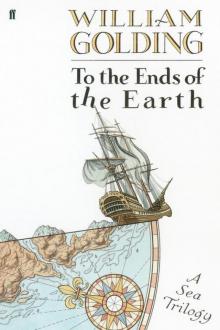 To the Ends of the Earth
To the Ends of the Earth Free Fall
Free Fall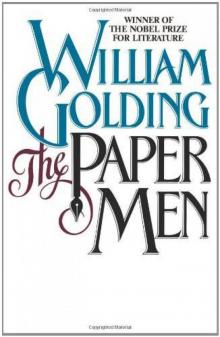 The Paper Men
The Paper Men The Spire
The Spire The Scorpion God: Three Short Novels
The Scorpion God: Three Short Novels The Inheritors
The Inheritors Darkness Visible: With an Introduction by Philip Hensher
Darkness Visible: With an Introduction by Philip Hensher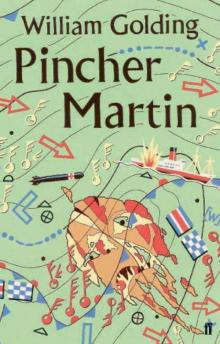 Pincher Martin
Pincher Martin The Pyramid
The Pyramid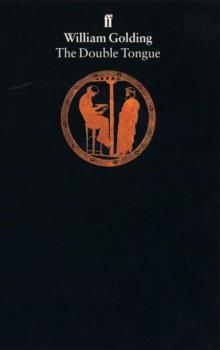 The Double Tongue
The Double Tongue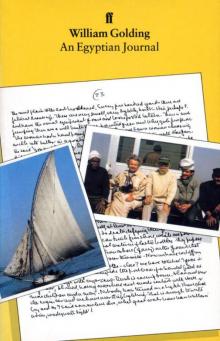 An Egyptian Journal
An Egyptian Journal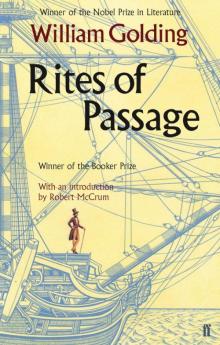 Rites of Passage
Rites of Passage Envoy Extraordinary
Envoy Extraordinary